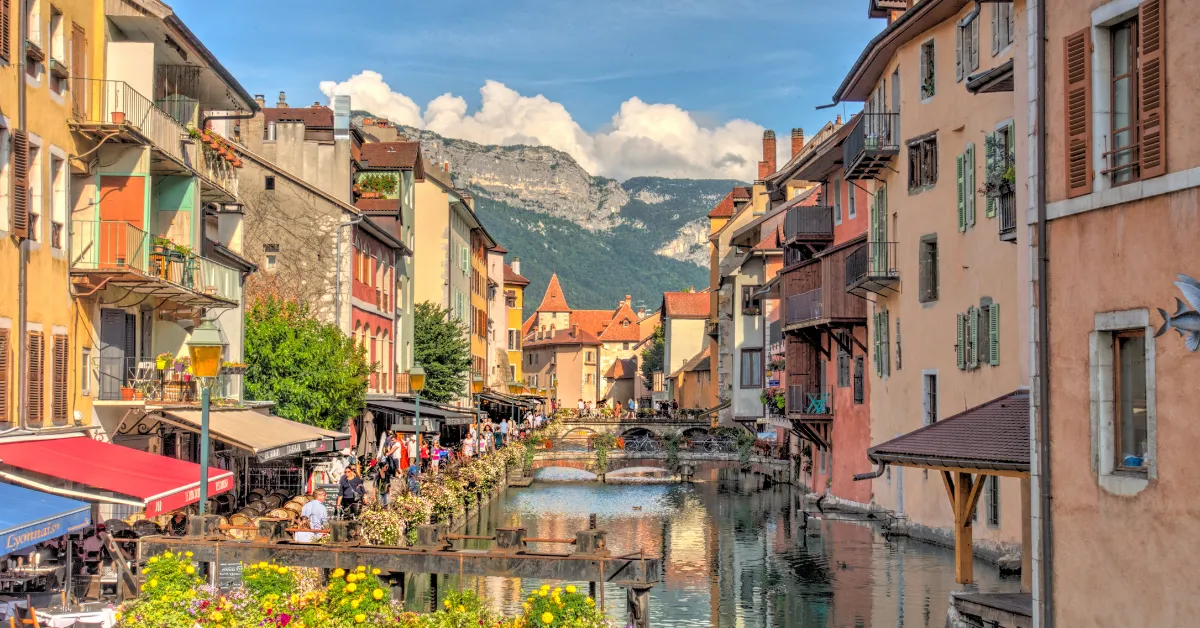Weighing up the pros and cons of living in France? The European country is home to one of the most iconic landmarks in the world — the Eiffel Tower and its capital city, Paris is known as the “City of Lights” for its magical illuminations that bring the city to life as the sun sets.
There is plenty to see beyond the capital, with picturesque vineyards, fragrant lavender fields, and sunny beach spots. If you’re considering moving to the home of the baguette, keep reading to find out the benefits and disadvantages of living in France.
Pros Of Living In France
There are plenty of advantages to living in France. In fact, there are too many to mention, but here are the top five reasons to consider packing your bags and heading to the land of the baguette.
Great Healthcare
Healthcare is one of those things that you hope to not need very often but is always a good thing to consider when weighing up where you want to live. Healthcare is accessible throughout France and heavily subsidized by government agencies.
You only need to live in the country for three months to qualify for a French healthcare card. This entitles you to reimbursement of between 75% and 100% of all of your care costs.
This includes doctors’ prescriptions, trips to the dentist, and visits to the hospital. Your income does not determine your eligibility for this care, and you won’t be turned away if you have a pre-existing medical condition.
Overall, France has one of the best healthcare policies for citizens in the world.
Slower Pace Of Living
If you’re coming from a country that is all go, go, go such as the US or UK, you’ll be pleasantly surprised by the change of pace in France. While other western countries seem to live to work, in France it’s the other way round.
While there is excellent access to jobs in the country, the focus is on enjoying life. If you’re applying to a French company, the standard amount of vacation days is between 25 and 40 and there are 11 public holidays spaced throughout the year.
The French enjoy spending time with their families, relaxing at home, and taking vacations. Once the 35-hour work week is over, it’s generally forgotten about to pursue more fun activities.
As a foreigner settling in France, this may take some adjustment, but once you start enjoying the art of doing nothing, life becomes much sweeter.
Delicious Food (And Wine)
It’s no surprise that France is regarded as the crème de la crème for its cuisine. After all, it is the country that invented the Michelin star. Its pastries are legendary across the globe, from flaky croissants to buttery pain aux raisin, crisp macarons, and fruity tarte tatins.
While patisseries showcase many exquisite sweet treats, France has more to its cuisine than its cakes. You’ll find boulangeries stacked with piles of soft French baguettes, and delicatessens brimming with all types of fragrant cheeses.
Unlike in many destinations, it’s possible to buy a lot of your food fresh and locally from bread shops, butchers, greengrocers, and deli counters.
National staple dishes include coq au vin, a chicken dish mixed with lardons and mushrooms, braised in wine. Ratatouille and beef bourguignon are also popular dishes.
If you’re an adventurous eater, you might even try the infamous escargot, which comprises snails that have been cooked in wine and garlic butter.
The wine is some of the best in the world and is made throughout the country, and some of the best grapes are grown in its southern regions.
Warm Weather
As a large country, France has a varying climate, depending on where you choose to lay roots. While northern regions of the country such as Paris, tend to be relatively rainy and cool, the further south you head, the warmer the weather.
In the French Riviera which includes the luxury destination of Saint-Tropez, the climate is Mediterranean. The summer months record highs of around 84°F/ 30°C, and the winters remain mild and dry.
The hottest cities in France include Marseille, Aix-en-Provence, Nice, and Toulouse.
Sustainablity
France is one of the most eco-friendly countries in the world. That’s not just our opinion — it’s constantly ranking in the top 5 countries for sustainability.
The country has excellent water sanitation, as well as low pollution emissions.
It’s illegal to discard unsold food from grocery stores and other food outlets, and eco-friendly infrastructure is used where possible, including hydro turbines along rivers across the country.
Other countries that are known for their sustainability are Denmark and Luxembourg.
Accessibility
In France, you can pretty much get anywhere by public transport. There’s a reliable and speedy metro service that frequently operates in most major cities, and in more rural areas, you can catch trains and buses.
If you’re choosing to live in a main town or city, you’ll have no need for a car, which will reduce your overall costs of living.
Speaking of costs, public transport is extremely affordable, and tickets run at just a few euros each, depending on whether you’re taking a train or bus.
If you want to spend your weekends exploring other parts of Europe, it’s also easy to organize. As France is located in mainland Europe, it’s possible to hire a car and drive to neighboring Switzerland, Germany, Italy, or Austria.
In fact, you can access almost anywhere in Europe by car, including islands such as the UK, thanks to its Eurotunnel. Once again, if you don’t have a car, it’s not a big deal. You can catch a train to other European destinations such as Amsterdam and Madrid within a few short hours.
There are also over 30 airports in France that connect you to the rest of the world.
Cons Of Living In France
No place is without its drawbacks. Here are several of the biggest disadvantages of living in France that you should be aware of.
High Costs Of Living
Compared with other parts of the world, it’s fairly expensive to live in France. In other hotspots for ex-pats and remote workers such as Thailand, Bali, and Mexico, you can live comfortably on $1,000 per month.
While you may find life in France slightly cheaper than in other western countries including the US, it’s certainly not known as a popular destination for those who are on a tight budget.
You can expect an apartment to cost you between $800 and $1,200 per month, depending on location and size. You’ll then pay other bills for utilities such as internet, phone, and electricity, which can run from $100 to $200.
Health insurance top-ups cost around $30 per month and grabbing a coffee will set you back $2.50 each time.
It’s estimated that living costs total around $2,000 per person each month, depending on the area you live in. If you’re considering moving to France with your partner or family, you’ll be able to reduce these costs slightly.
Expense is one of the major disadvantages of living in France compared to other countries in Europe.
Language Barrier
The language barrier can be one of the pros and cons of living in France. The main disadvantage? You’ll have to learn a whole other language. The benefit?
You’ll get to learn a whole other language! In major cities such as Paris, you’ll find that some English is spoken, but even in these main destinations, you shouldn’t rely on it as French is still the number one language.
Luckily, as a Latin language, the alphabet remains the same as in English and other European languages, which makes it easier to learn new words as they are often similar to their English counterparts.
You can learn French through an app, use a guidebook, or rely on trusty Google Translate to help you in situations where you can’t find the right word.
Difficulties Settling In
As a foreigner, it can be tricky to find an apartment. On top of that, it can also be difficult to open a bank account. Unfortunately, you kind of need both.
Wherever you’re coming from, you’ll usually pay tax in your home country on top of tax in France. In order to get a bank account, you’ll usually have to fill in a lot of paperwork and possibly go through an interview process, before you can deposit your money in a French account.
When it comes to housing, again there is a lot of paperwork and other processes which can be lengthy and irritating.
Visas
Depending on how long you want to stay in the country, one of the cons of living in France is the visa situation. If you come from an EU country, you’ll find it incredibly easy to dart between countries as there is free movement across all EU Member States.
However, if not, you may need to fill in a fair amount of paperwork to reside in France. You’ll need different visas depending on the work you choose to do, and if you’re attempting to find a job in the country, you’ll need to attain this via a sponsorship before moving.
Final Thoughts On Living In France
Now you know the main pros and cons of living in France, you’ll be able to decide whether it’s the right place for you to settle down for a while.
As with anywhere, there are plenty of advantages, as well as a few drawbacks to consider. If you’re looking for a country that has a low cost of living where English is widely spoken, France may not be for you.
However, we think the incredible landscapes and perfect croissants make it a winner every time.
Are you still trying to make up your mind on where to live? Check out these posts:
Do you have your travel insurance?
- ☑ SafetyWing offers affordable travel medical insurance. Prices start at $45.08 / 4 weeks.
- ☑ Created by nomads, for nomads.
- ☑ Covers quarantine and Covid-19.
- ☑ You can pay per month, and stop at anytime.



